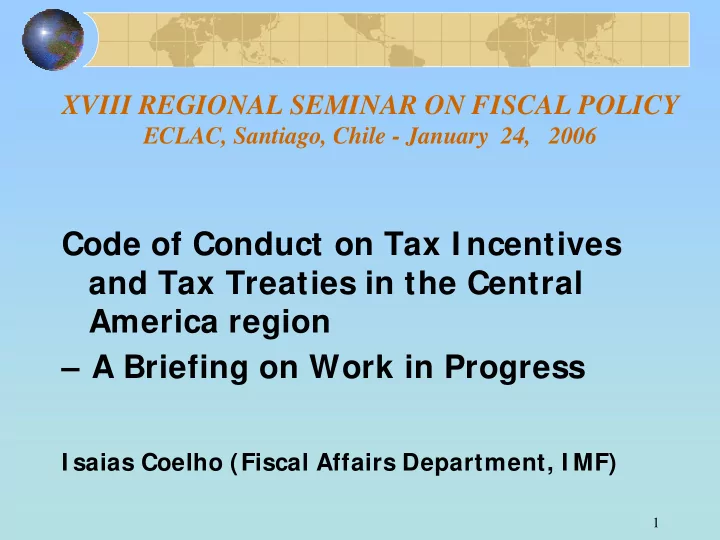

XVIII REGIONAL SEMINAR ON FISCAL POLICY ECLAC, Santiago, Chile - January 24, 2006 Code of Conduct on Tax I ncentives and Tax Treaties in the Central America region – A Briefing on Work in Progress I saias Coelho (Fiscal Affairs Department, I MF) 1
Motivations CAFTA-DR agreements, by opening a large export market (the U.S.) to exports from Central America and the Dominican Republic, prompted new interest for FDI in the region When deciding where to locate, FDI considers, among other factors, The effective level of taxation of enterprise income The transparency and stability of tax rules 2
Tax Competition To decrease effective taxation, FDI often tries to extract tax exemptions or preferences, sometimes playing a country against another This could lead to a “race to the bottom” where tax bases are eroded to a great extent, frustrating one of the benefits of FDI for the host countries 3
Points To Keep In Mind Regardless of CAFTA-DR, countries of region are also keen on updating the income tax, especially its int’l aspects there is a longstanding movement in the region for coordination of economic policies, including in the tax area c ountries of the region face tight fiscal situations, with a low ratio of tax revenue to GDP in most countries 4
Principles For Tax Coordination... ... in Central America: Protect the tax bases and strengthen the tax systems Maintain a friendly tax environment for investment through moderate and predictable taxes Avoid tax discrimination and tax competition Respect national sovereignty 5
Recent Tax Coordination Efforts Seminar in Guatemala (March 2005—country authorities plus I MF, I ADB, World Bank, CI AT, SI ECA) identified priority tax coord. areas Ministers of Finance (Managua June 2005 and Washington July 2005 meetings) established three working groups on tax policy and tax and customs administration. The first, Working Group on Tax Coordination , was the first to be installed Working Group meets every other month since then 6
Current Work Preparation of a Code of Conduct on tax incentives to investment Drafting of a regional Model Treaty to Avoid Double Taxation of I ncome and Capital Outline of a strategy for handling transfer pricing issues— still at an early stage 7
Role Of Ministers Of Finance Ministers of Finance define the priority and sequencing of the work, and decide on the policy conclusions Essential feedback from the ministers is provided through the representatives and regional ministerial meetings held occasionally 8
Technical, Financial Support Work is supported by the I MF ( Fiscal Affairs & Legal Depts ), the I ADB ( I ntegration & Regional Programs Dept ), and the Spanish Government ( via Technical Assistance Subaccount at the I MF ). FAD coordinates Working Group’s Secretariat rotates among participating countries Participating countries: Costa Rica, El Salvador, Guatemala, Honduras, Nicaragua, Panama, Dominican Republic 9
Code Of Conduct On Tax Incentives A honor-based understanding, not a legally binding document Aims at providing good climate for investment while avoiding harmful tax competition Corporate income tax the first priority Precedent: European Union 10
WG Criteria For Tax Incentives Equal treatment of residents and nonresidents Equal treatment of all nonresidents Neutrality of project’s NPV regarding location in the region No favored administrative treatment of foreign investment 11
Current Work On Code Of Conduct Text being drafted for discussion in Managua in February 2006 Countries preparing matrix of tax incentives � Next: classification of incentives according to criteria, and discussion of phasing out for those failing to meet criteria 12
Issues On Code of Conduct Practices to ensure transparency of tax incentive schemes Rules for determining NPV and burden of proof Whether a minimum corporate tax rate (nominal or effective) should be adopted Whether rules on VAT should be included (especially on refunds to exporters) ... 13
Issues On Code of Conduct (ctd.) ... Tax treatment of free zones whose elimination has been agreed with the WTO Scope for incentives to development of least developed regions [Tailored] calendar for the elimination of incentives that conflict with Code Mechanism for the resolution of conflicts or noncompliance that may arise over time 14
Double Taxation Treaties Objective is preparing a model tax treaty for the region, which serve as basis for bilateral negotiations with third countries Treaties are sought by prospective investors in Central America as protec- tion against sudden changes in the tax laws. Countries in region see treaties as making area more attractive to FDI WG considering existing models (OECD, U.N., Andean Group) to identify features best suited for region 15
Current Work On Tax Treaties Text of model tax treaty being drafted for discussion in Santo Domingo in March 2006 Countries preparing information on their tax systems, to support the draft � Next: Recommendations for development of capacity for treaty negotiations and establishment of an international tax unit in each ministry of finance 16
Some Issues On Tax Treaties Current state of treaty negotiation in the region Criterion for income taxation: residence (world income) or source (territorial)? Suitability of regional (multilateral) treaty I dentification of features of existing laws that hinder tax treaties Feasibility of joint negotiation (of bilateral treaties) with third countries Sequencing for negotiation: which capital-exporting countries first? 17
Working Group Members 18
Thank you for your support! 19
Recommend
More recommend